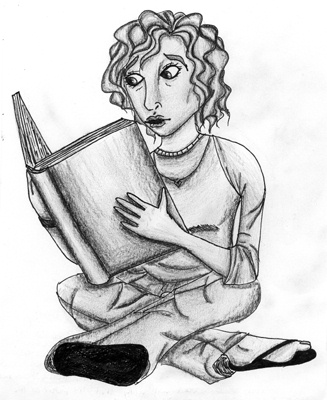All Nonfiction
- Bullying
- Books
- Academic
- Author Interviews
- Celebrity interviews
- College Articles
- College Essays
- Educator of the Year
- Heroes
- Interviews
- Memoir
- Personal Experience
- Sports
- Travel & Culture
All Opinions
- Bullying
- Current Events / Politics
- Discrimination
- Drugs / Alcohol / Smoking
- Entertainment / Celebrities
- Environment
- Love / Relationships
- Movies / Music / TV
- Pop Culture / Trends
- School / College
- Social Issues / Civics
- Spirituality / Religion
- Sports / Hobbies
All Hot Topics
- Bullying
- Community Service
- Environment
- Health
- Letters to the Editor
- Pride & Prejudice
- What Matters
- Back
Summer Guide
- Program Links
- Program Reviews
- Back
College Guide
- College Links
- College Reviews
- College Essays
- College Articles
- Back
Why Read Jane Austen?
It is a truth universally acknowledged that humans have differing opinions on most everything. For example, some people loved the movie Titanic and cried for its three-hour duration, while others simply didn’t understand its sentimental value. But does that mean that the people who didn’t watch the movie should form opinions about it, just like everybody else?
Maybe Susie, who loves watching old soap operas, decided she liked Titanic without having watched it, but after she did, she found it was dull and excessively lengthy. Maybe Joe, the hefty football player, decided Titanic was too emotional for someone like him to endure, but after watching it for the first time, he felt tears rolling down his face.
It is the same way with the novels of Jane Austen. A common misconception about her novels is that nothing happens in them except for a group of Victorian ladies drinking tea and gossiping and wearing lace dresses to stuffy dances. Somehow, in this uneventful mess, these ladies fall in love and marry rich, elderly men, concluding a soppy, corny book.
This fallacy is incorrect on so many different levels. First of all, Jane Austen novels are set in the regency era, which preceded the Victorian era. Tea-drinking is minimal, as is the use of pointless gossip. Dresses are rarely discussed, if at all, and the books, though they are romances, are not at all soppy or corny.
Most importantly, Jane Austen’s books are not best known for the romance or the dancing or the tea-drinking. They are known for the sarcastic, humorous way in which she writes them. Each book reflects a different type of personality that Austen must have come across at some point in her life, and each book parodies a custom of 19thcentury British society. Northanger Abbey satirizes Gothic novels, which were “all the rage” at the time. Sense and Sensibility burlesques the concept of what many would do for money. Pride and Prejudice mocks the shallow standards, such as wealth or beauty, which people use to judge others.
However, Austen’s novels also take on a more serious tone; her novels actually provide as “counselor” for many people. William Deresiewicz, author of A Jane Austen Education: How Six Novels Taught Me About Love, Friendship, and the Things That Really Matter, says, “It’s a cliché but nevertheless true that we lack any kind of moral clarity now. All those traditional sources of moral authority have been significantly weakened.” According to Deresiewicz, Jane Austen’s novels have strong characters and stronger morals that many of the people of today could learn from.
Lori Smith, author of two other Austen-related books, says that “It seems a little strange to take advice from someone who lived two hundred years ago. We think the 19th century was so different but really they were facing a lot of the same issues.” Smith takes a similar viewpoint as Deresiewicz, saying that people can learn a lot from Jane Austen, that her stories address matters that are still relevant today, and that her characters are, essentially, role models.
So, if a cleverly written novel was relevant even after two centuries, was a provider of literary refuge for avid readers, and was full of strong and realistic characters, wouldn’t one expect it to be widely read and universally loved by teenagers? The answer will be surprising to many: no; and the reason for this answered can be explained below.
“One half of the world does not understand the pleasures of the other.” –Emma
In 1815, these words were first written, and first read by half of the residents of England. The other half, as proven by the quote, did not understand, or even wish to understand, the sudden buzz about Jane Austen and her novels. Now it is 2012, almost two hundred years after the publication of Emma. Isn’t it about time that the quote was proven wrong?

Similar Articles
JOIN THE DISCUSSION
This article has 1 comment.

8 articles 1 photo 16 comments
Favorite Quote:
- Begin doing what you want to do now. We have only this moment, sparkling like a star in our hand ... and melting like a snowflake. -- Ray<br /> - Don’t tell me the moon is shining; show me the glint of light on broken glass. -- Chekhov